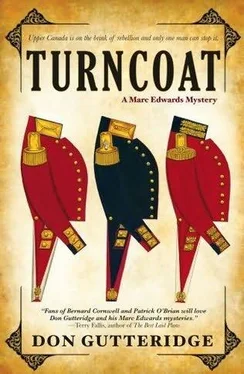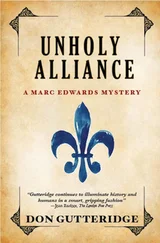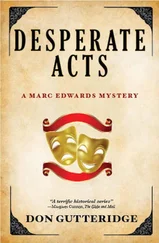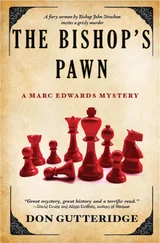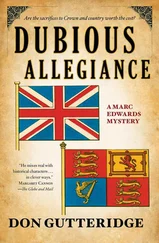Don Gutteridge - Turncoat
Здесь есть возможность читать онлайн «Don Gutteridge - Turncoat» весь текст электронной книги совершенно бесплатно (целиком полную версию без сокращений). В некоторых случаях можно слушать аудио, скачать через торрент в формате fb2 и присутствует краткое содержание. Год выпуска: 2003, Издательство: Simon & Schuster, Жанр: Исторический детектив, на английском языке. Описание произведения, (предисловие) а так же отзывы посетителей доступны на портале библиотеки ЛибКат.
- Название:Turncoat
- Автор:
- Издательство:Simon & Schuster
- Жанр:
- Год:2003
- ISBN:нет данных
- Рейтинг книги:4 / 5. Голосов: 1
-
Избранное:Добавить в избранное
- Отзывы:
-
Ваша оценка:
- 80
- 1
- 2
- 3
- 4
- 5
Turncoat: краткое содержание, описание и аннотация
Предлагаем к чтению аннотацию, описание, краткое содержание или предисловие (зависит от того, что написал сам автор книги «Turncoat»). Если вы не нашли необходимую информацию о книге — напишите в комментариях, мы постараемся отыскать её.
Turncoat — читать онлайн бесплатно полную книгу (весь текст) целиком
Ниже представлен текст книги, разбитый по страницам. Система сохранения места последней прочитанной страницы, позволяет с удобством читать онлайн бесплатно книгу «Turncoat», без необходимости каждый раз заново искать на чём Вы остановились. Поставьте закладку, и сможете в любой момент перейти на страницу, на которой закончили чтение.
Интервал:
Закладка:
“Don’t mind her none,” Hatch said. “She’s a bit set in her ways.”
And her straightforward, no-nonsense ways were certainly not those of the young ladies Marc had encountered at the mess parties and the soirees of Government House, ladies whose “aristocratic” breeding and overwrought manners seemed barely able to tolerate the indignities of mud-rutted streets, slatternly servants, uppity tradesmen, and stiff-fingered seamstresses.
“She’s quick with figures, mind-like her mother,” Hatch was happy to add. “And a handsome lass, eh?”
Summoning his own good manners, Marc said, “Most men would describe her so.”
Marc was looking forward to the challenge of eliciting essential and perhaps incriminating information from Israel Wicks, Azel Stebbins, and Orville Hislop-the trio of suspected extremists passed on to him by Sir John. But he was not anticipating with any pleasure the imminent interview with Beth Smallman. The death of a loved one-especially a parent-was devastating. And while he himself had been a mere five years old when both his parents had died of cholera, he could still recall the numbing sense of loss, the abrupt rupturing of the world he had believed permanent and incorruptible, and the long, bewildering absence that followed and would not be filled. More immediate perhaps was the love he felt for “Uncle” Jabez, who had adopted him and raised him up in ways that would have been inconceivable had his parents survived. Beth Smallman had seen her husband hang himself out of some deep despair, the roots of which Marc knew he must probe, and barely a twelvemonth later she had suffered the unexplained death of a father-in-law she had come to revere as much or more than she had her husband. How and why that affection had grown, and its consequences, were facts he had to learn, if his investigation was to be rigorous and objective.
Taking a deep breath, Marc turned onto the Smallman property.
“You again, is it?”
“My visiting your mistress is no concern of yours,” Marc said when he had recovered from the shock of Elijah’s sudden materialization-this time from behind the manure pile in the stable yard. He realized immediately the ineptness of such a reprimand here in the bush, but not before Elijah had guffawed with his own brand of upstart contempt.
“The missus and me’ll decide what concerns us,” Elijah said. “We ain’t impressed by no fancy uniform.”
Marc ignored the remark and switched tactics. “When did you leave your cabin and walk up to Philander Child’s place on the day your master died?” he demanded in his best drill-sergeant’s voice.
Elijah’s eyes narrowed, and his ungloved fingers squeezed more tightly around the handle of his pitchfork. “And who wants to know?”
“The lieutenant-governor,” Marc said, bristling.
But Elijah had already turned away and was now ambling towards the barn. As he went in, he called back over his shoulder, “Don’t tha’ be long up there. I won’t have ya upsettin’ the missus.”
So much for imperial authority.
“You’re wonderin’ why I’m not draped in widow’s weeds,” Beth Smallman said.
In truth, Marc was silently noting not the absence of mourning attire but the arresting presence of a plain white blouse, brown woollen skirt, and an unadorned apron that might have been stitched together out of discarded flour sacking. Once again her flaming russet hair was behaving as it pleased.
“Well, there’s no one would see them, is there?” she said, once again seated across from him in the tender light of the south window. “Besides, grief goes much deeper than crêpe or black wreaths upon doors.”
“I apologize, ma’am, for the necessity of this interview-”
“Please don’t,” she said. “I’m as eager to learn why Father died in the way he did as you and the governor are.” Her face was grave but not solemn. She struck Marc as a woman who would do her weeping at night-more Scots than Irish. “Livin’ with ‘whys’ that never get answered is as hard as grievin’ itself.”
That she was alluding to her husband’s death as much as to her father-in-law’s was not in doubt. But Marc was not ready to take up that cue. Not yet. “It is the why, the motive, that I need to discover,” he said quietly. “And to do so, I must learn as much as possible about your father-in-law’s thoughts and feelings and actions over the past few months.”
“I understand,” she said. Her voice was breathy and low: she would be an alto in the Congregationalist choir, he thought. “I’ll help in any way I can.”
“My task is made somewhat easier by the fact that until your husband passed away a year ago, your father-in-law lived and worked in Toronto. We need to focus then on those activities he took up here subsequent to his return.”
“He was born here,” she reminded him, “and grew up on a farm near Cobourg. When his father died, he sold the farm and moved to Toronto-it was still York then. He enjoyed the country very much, but his talents lay in business, in the life of the town.”
“And your husband’s?”
Beth paused, smiled shrewdly, and said, “They did not share similar interests.”
Marc decided it was politic to sip at his tea and sample a biscuit before he spoke again. “Jesse was not enamoured of dry goods?”
“While his mother was alive, he pretended to be. When she died seven years ago, Jesse took the money she left him from her own father’s estate, moved back here where they were just opening the township, and bought this farm.” She looked down at her tea but did not drink. “He felt he’d come home.”
The scraping of a boot along floorboards announced the entrance of Aaron. Marc waited patiently while Beth fussed over the boy, tucked a biscuit into his twisted mouth, did up the top button of his mackintosh, and escorted him back outside, whispering instructions into his ear as if she were not repeating them for the hundredth time.
When the tea was replenished and she was seated again, she said, “You’ll want to know how we met.”
“Pardon me for saying so, but you don’t look as though you’ve been a farm girl all your life.”
“You’re very observant for one so … young,” she said. And so coddled and pampered and protected from the true horrors of the world, she implied with her single, taut glance. “But these are genuine calluses.” She showed both her palms while the cup and saucer teetered on her knees. “You learn how when you have to, and quickly.” That she herself was younger than he appeared to be of no relevance.
“You met your husband here, then?”
“My father was the Congregationalist minister in Cobourg. We came up here when I was eight, after my mother died back in Pennsylvania.”
“But your husband was Church of England,” Marc said.
Once again he was raked by that appraising gaze. “A venial sin,” she said. “Congregationalists are a tolerant lot. And democratic to boot.” She watched to see the effect of this last remark.
“Would you say that relations between Jesse and Joshua were strained?”
“Did Father come to the wedding, you mean?”
“Did he approve of the … way his son’s life was going?”
“He came down for the wedding at St. Peter’s in Cobourg.”
“And that was …?”
“Almost four years ago. Jess and I came directly here.”
“Did his father visit?”
Each new question seemed to disconcert her just a bit more, but the only outward sign of discomfort was the length of the pause before she could answer. When she did, Marc could see no indication that she was reluctant, withholding, or evasive.
“Only at Christmas. And once at Easter.”
When the thorny issue of whose church to attend must have complicated matters.
Читать дальшеИнтервал:
Закладка:
Похожие книги на «Turncoat»
Представляем Вашему вниманию похожие книги на «Turncoat» списком для выбора. Мы отобрали схожую по названию и смыслу литературу в надежде предоставить читателям больше вариантов отыскать новые, интересные, ещё непрочитанные произведения.
Обсуждение, отзывы о книге «Turncoat» и просто собственные мнения читателей. Оставьте ваши комментарии, напишите, что Вы думаете о произведении, его смысле или главных героях. Укажите что конкретно понравилось, а что нет, и почему Вы так считаете.
